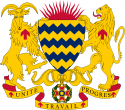- Chadian constitutional referendum, 1996
-
Chad 
This article is part of the series:
Politics and government of
Chad- Constitution
- President
- Prime Minister
- Emmanuel Nadingar
- Government
- National Assembly
- Speaker
- Political parties
- Elections
- Regions
- Departments
- Sub-prefectures
- Foreign relations
A constitutional referendum was held in Chad on 31 March 1996 to approve or reject the new constitutional draft meant to definitively replace the Transitional Charter established by the Sovereign National Conference in 1993.[1] It was passed by 63.5% of voters with a 61% turnout.
Contents
Background
Chadian President Idriss Déby had promised since his rise to power in 1990 to transit Chad to a multiparty democracy. Despite these promises, Déby slowed the process in an attempt to maintain full control over the process. This worried France, Chad's former colonial power, as it noted that by 1995 only Chad had yet to hold multi-party elections. Putting pressure on Déby, he forced him to open on 6 January 1996 in Franceville, Gabon, a round table with the 15 armed groups and 58 opposition parties present in Chad.[2][3]
The reconciliation conference resulted in a failure, as it soon foundered on procedural points and questions of representation, and, at a deeper level, due to the deep mistrust between Northern and Southern Chadians. All the same, the conference was proficous to Déby who used it to divide the opposition, according himself with those formations willing to put an end to armed confrontation with the government.[2]
With a presidential decree on 6 March Déby established that the referendum would take place on 31 March.[3] Despite a certain degree of administrative confusion with the assistance of the French garrison present in the country the referendum was carried out successfully.[2] This did not avoid some abuses during the referendum campaign, such as the arrest by local authorities of the leader of the Ligue tchadienne des droits de l'Homme (LTDH) in Bongor, who had asked a village headman to follow the indications of the Independent National Electoral Commission (CENI), which prohibited to campaign on the referendum day.[4]
Monitoring
The Agency for Cultural and Technical Co-operation of the Francophonie, in its report on the presidential elections, mentioned the main criticisms moved towards the referendum's conduction. These centered on four points, concerning the inadequacy of the personnel encharged of the polling stations and the local electoral commissions, the absence of neutrality in the recruitment of said personnel, scarce respect of the electoral code during the count of votes and the unhomogeneous distribution of the referendum material.[3]
The referendum was monitored by the Independent National Electoral Commission, controls the validity of the electoral rolls, guarantees over the distribution of the electoral material and over the nomination and formation of the presidents of the polling stations. The CENI is composed of 21 individuals, nominated in equal parts by the government, the Conseil Supérieur de Transition (i.e. the provisional parliament) and the political parties.[3] The CENI published on 8 April the provisional results of the referendum, which saw a victory for the "yes" by 61,46%, while the "no" took 38.54%, the latter obtaining a clear majority in 4 of the 18 Chadian prefectures, all collocated in southern Chad.[5] These results were revised by the N'Djamena Court of Appeals, which replaces for the time being the Constitutional Council and the Supreme Court as the highest juridiction in Chad, as the latter have yet to be instituted. The court rejected a number of ballots for technicalities[6], raising the "yes" victory to 63.5%, which result it officially validated and made public on April 13. The Court also immediately proceeded to proclaim the Constitutional draft the new supreme law of the State, and the following day, on April 14, President Idriss Déby provided to promulgate it.[3]
Results
Choice Votes % For 1,201,782 63.5 Against 700,362 36.5 Invalid/blank votes 88,525 - Total 1,990,669 100 References
- ^ Failure to protect human rights Chad: Under the arbitrary rule of the security forces with the tacit consent of other countries 10 October 1996. Amnesty International
- ^ a b c Richard Cornwell, "Africa Watch Chad: Fuelling the flames", African Security Review, Vol. 8, No. 5, 1999
- ^ a b c d e Rapport de la Mission Exploratoire en vue des Elections Presidentielles des 2 et 23 Juin 1996 democratie.francophonie.org (French)
- ^ The victims Chad: Under the abitrary rule of the security forces with the tacit consent of other countries, 10 October 1996
- ^ "Tchad: La nouvelle constitution adoptee" Le Monde, 10 April 1996
- ^ Buijtenhuijs, Robert (June 1996). ""Le Tchad est inclassable": le référendum constitutionnel du 31 mars 1996" (PDF). Politique Africaine (62): 117–123. http://www.politique-africaine.com/numeros/pdf/062117.pdf.
 Elections and referendums in Chad
Elections and referendums in ChadPresidential elections Parliamentary elections French elections 1946 · 1951 · 1956 · 1958Referendums Categories:- Elections in Chad
- 1996 in Chad
- Referendums in Chad
Wikimedia Foundation. 2010.
